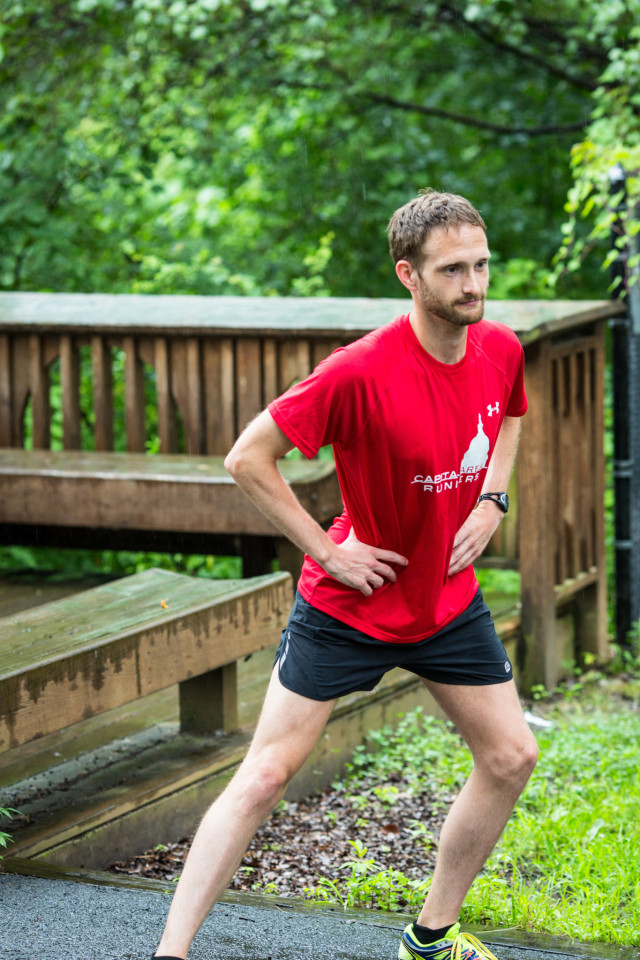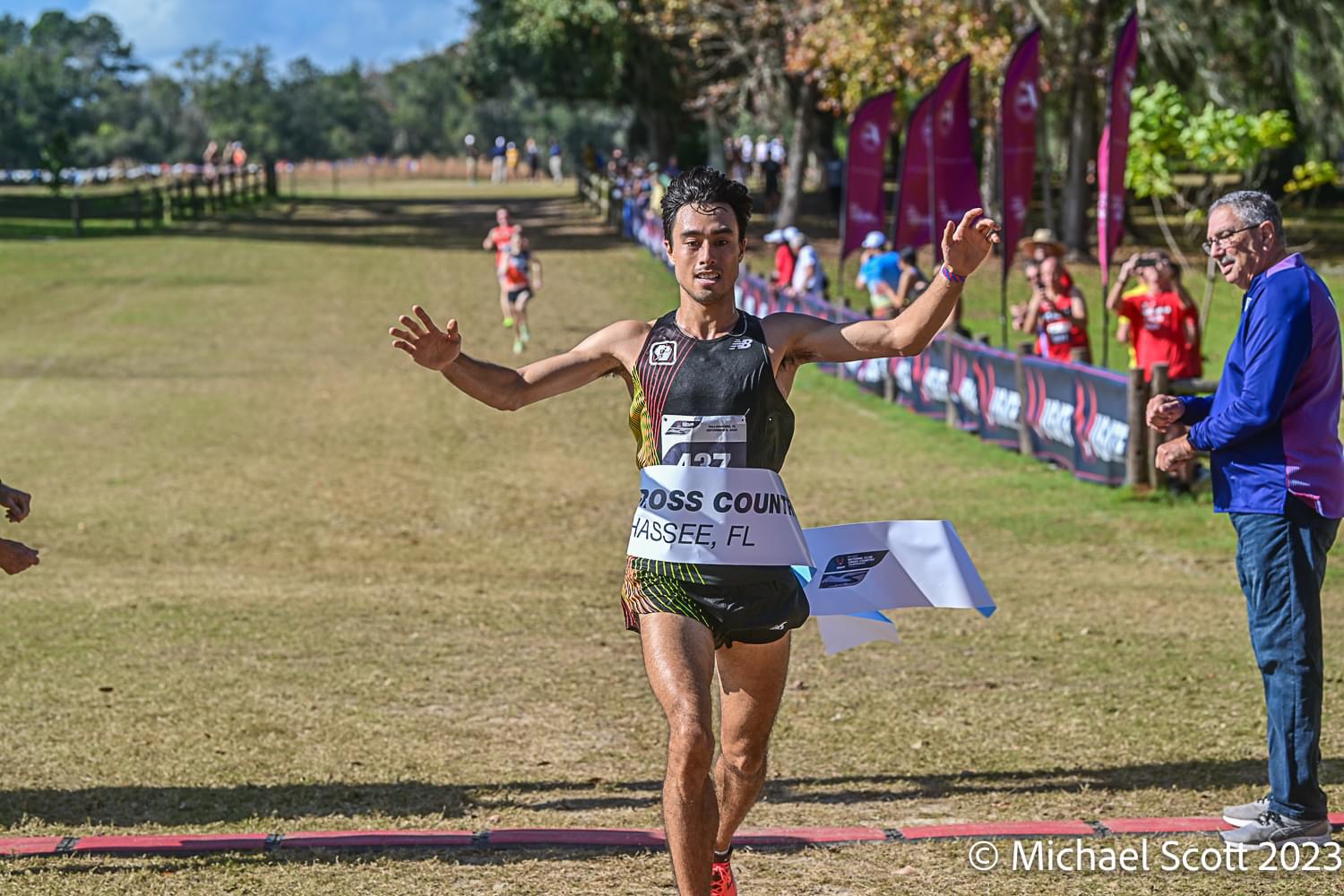In the months leading up to 2015’s Fall marathons, RunWashington will follow several local runners as they prepare for their races. We’ll chart their progress as they train their legs, lungs and minds for the challenges they’ll race on race day. Each week, we’ll catch up with our runners and see how they’re doing. Matt Deters is training for the Philadelphia Marathon. Read more about him here and here.

After a summer colored by training ups and downs, including nagging pains, a lingering bug, and the ongoing battle with Washington weather, Matt Deters, who performs better at cooler temps and lower dew points, is really starting to feel like he’s found his footing.
Deters still doesn’t like the heat, but after a long summer, he’s functioning better in it. He’s upping his game when it comes to hydration and continuing his commitment to injury prevention. Now that he’s into the meat of marathon training, all the little things are coming together.
Much of Deters’ daily and weekly routines center around running, but he likes it that way. “It’s very rigid, each day is similar,” he said.” That’s actually important to marathon training. Certain people like that. I find that really centers my life.
When he thinks about it, running takes up about three hours out of his day, or 20-30 hours per week. His training involves miles, miles, and more miles. Last year, running 100 miles in a week was a goal for Deters, now he is doing that as part of his regular training regimen.
The training cycle Deters and his teammates are following is the same one he was doing going into last year’s Glass City Marathon – a great race that almost was. In fact, after putting up an exceptional half marathon performance of 1:09:45 at Shamrock, Deters had two races cut short – Cherry Blossom, cut short after a motorcycle crash, and Glass City, which was cut off for Deters by poor course management.
Deters is hoping to set a ten mile PR at the Army Ten-Miler and is hoping to match his performance at last year’s Shamrock Half in the Navy-Air Force Half Marathon. He has started looking at the qualification times for the U.S. Half Marathon Championships, which, at 1:08, is a jump, but not impossible by any means.
Deters’ training plan was devised by Capital Area Runners coach George Buckheit, whose coaching philosophy, honed over 35 years of coaching marathoners, involves doing many hard long run workouts reaching marathon pace. To counterbalance, the plan also involves a lot of running slow in between hard workouts. In the two week training cycle Deters and his teammates follow, they get five hard workouts in. These include the long progression runs reaching marathon pace as well as tempo and track runs. But the rest of the runs, the miles Deters puts in largely on his commute to work, are supposed to be done easy. To Deters this means a per-mile pace of between 7:00 and 8:00.
His coach explains it this way – “a lot of marathoners think they have to be out there bashing it every day, but with five days hitting it hard, the rest of the time is easy recovery stuff,” Buckheit said. Deters takes this to heart. “A lot of guys who are very competitive ignore that. He buys in.”
Buckheit’s training regimen involves running long runs with significant portions at marathon pace. Progression runs serve multiple purposes – runners have to hold themselves back at the beginning, a challenge to any level and pace of runner, and a crucial skill for maximum velocity racers like Deters and his cohort.
Progression runs also teach runners what it feels like to be at high miles on tired legs at marathon pace. Reaching peak marathon pace at mile 14 of a 21 mile run is a good way to get a feel of what’s coming on race day. Deters has the advantage of having done a very similar training cycle before, and he can feel a slight edge this time around. “My last run I averaged 5:38 for the last seven miles. The same effort last spring was in the 5:40s.”
In addition to closely following the training model of his coach, Deters works on his form consistently. He has gleaned some useful knowledge from the concepts of chi running. “By keeping my pelvis rotated, my back aligned correctly, and my center of gravity where it needs to be, I feel like I can really enjoy my running.” In addition to that, he strengthens his neuromuscular system by working high knees, butt kicks, and other drills to hone his form.
The unexciting things seem to be paying off well for Deters. Running slow on his easy days. Turning in early on weeknights and getting eight hours of sleep. Eating his vegetables. Hydrating. Foam rolling. He’s reached the point in training where he’s “tired, eating all the time, running out of time to do things, but you still feel good,” Deters said.
His performance at the Navy-Air Force Half will be interesting to keep an eye on. “I think he’s very ready. If we get good weather he could be somewhere around 1:08ish,” Buckheit said.
In terms of Philly, Deters says his “B” goal is to break 2:30. Since he doesn’t know what that pace feels like after mile 21, he thinks he can do it but hasn’t had the chance to yet. “Deep down I feel like I could do 2:26. But, I could also break my ankle or get hit by a truck. You just gotta roll with the punches,” Deters said, leaving the door open, as his recent racing history has taught him, for any eventuality.
Buckheit hesitates to make a firm time prediction for Deters due to the unpredictability of the marathon, but think Deters performance will be “at a bare minimum, under 2:30, if everything aligns – 2:25,” Buckheit said.
When asked if the Glass City fiasco is likely to impact Deters’ performance, his coach echoed what teammates have said, “he took it better than I would’ve,” and went on to say that its only adding to his drive, “he’s right back where he was, training wise. It didn’t piss him off, it made him hungrier,” Buckheit said.
With a half marathon and a ten miler coming up before his marathon performance just like last spring, Deters will have ample opportunity to gage his progress from last season, and then he’s got a typically cold, big city race with big city course marshals and markings to get him to the finish line.
Buckheit thinks Deters will be good to go as long as he makes it to the start. “He’s a tough guy,” he said. “I hope everything comes together for him and we get him to Philly in one piece.”
Recent Stories
Looking for our race calendar? Click here Submit races here or shop local for running gear
James W. Foley Freedom Run
Inspired by the moral courage of freelance journalist James Foley, the mission of the nonprofit Foley Foundation is to secure the freedom of Americans held captive abroad unjustly by terrorist organizations or rogue states, and to promote journalist safety.
The
Kensington 8K Race
Since 1994, the Kensington 8K Race has been a favorite DC area fall race – a fun, fast event with beauty, challenge, and excitement. Run it this year on Saturday, September 21, 2024!
The 8K distance is $39, with a






